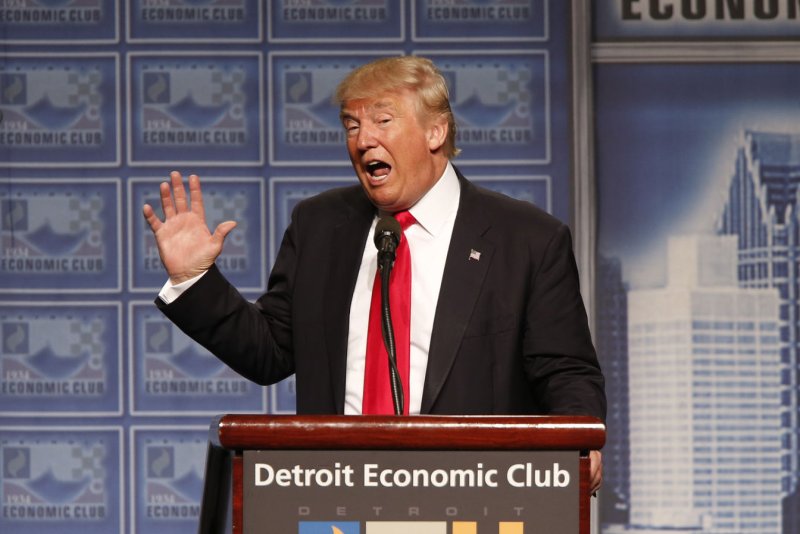1 of 7 | Republican U.S presidential nominee Donald Trump addresses the Detroit Economic Club where he introduced his economic plan in Detroit, Michigan, August 9, 2016. Photo by Rebecca Cook/UPI |
License Photo
DETROIT, Aug. 8 (UPI) -- In a major economic speech in Detroit on Monday, Republican presidential nominee Donald Trump proposed the biggest tax reform since Ronald Reagan's administration, with cuts at all income levels.
Trump proposed three income-tax brackets of 12 percent, 25 percent and 33 percent instead of the current seven tiers ranging from 10 percent to 39.6 percent. His three brackets are the same as ones proposed by House Republicans under Speaker Paul Ryan in June.
"No one will pay so much that it destroys jobs, or undermines our ability as a nation to compete," he said at the Detroit Economic Club, in a speech that was repeatedly interrupted by protesters.
He said his campaign is "about how to make America great again for everyone and, especially, and I say especially, for those who have the very least."
Trump's proposal would allow parents "to fully deduct the average cost of child care spending from their taxes."
Currently, parents can deduct up to 35 percent of qualifying expenses for a maximum $3,000 deduction for one child and $6,000 for two or more children. His opponent, Hillary Clinton has proposed a cap on child care costs at 10 percent of a family's income.
The billionaire proposes to end the estate tax -- nicknamed the "death tax." The 40 percent tax applies to estates larger than $5.45 million for individuals and $10.9 million for couples.
Trump also proposed a 15 percent tax rate for businesses.
He is seeking the elimination of special tax treatment for carried-interest income at private-equity firms and other investment firms. Carried interest is a portion of investment gains paid to certain investment managers and is now taxed like capital gains at rates as low as 23.8 percent. Trump proposes to tax them as ordinary income.
The nominee proposed temporarily halting new agency regulations
Trump still opposes the Trans-Pacific Partnership trade agreement backed by the Obama administration and many prominent Republicans in Congress.
Trump repeated his positions on the following: asking TransCanada to renew its Keystone pipeline permit application, rescinding the Climate Action Plan and "waters of the U.S." rule; opening offshore drilling; and killing the Paris climate agreement.
As a lead-up to his big speech Monday, Trump named an economic advisory council last week.
Trump pointed to Detroit as a "living, breathing example of my opponent's failed economic agenda."
"She's the candidate of the past and ours is the campaign of the future," Trump said. "Every policy that has failed Detroit has been fully supported by Hillary Clinton. The one common feature of every Hillary Clinton idea is that it punishes you from working and doing business in the United States."
On Thursday, Clinton also plans to also give an economic speech in Detroit.
Clinton, who was in Florida on Monday to campaign, released a statement before Trump's speech, saying he is pushing an agenda "that experts across the political spectrum say would lead to a recession and cost millions of American jobs."
Clinton's campaign says Trump's policies amount to big tax breaks for corporations and businesses.
They noted Trump doesn't support debt-free college, paid family leave or a federal minimum wage.















